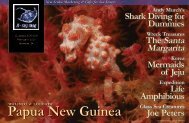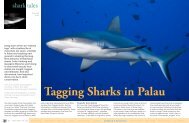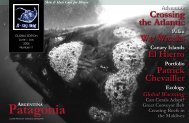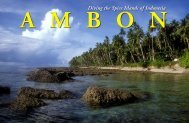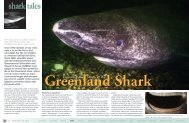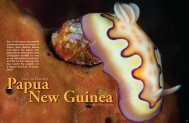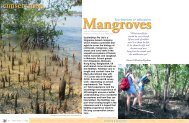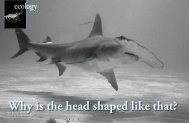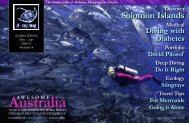Medium resolution version of X-Ray Magazine (96 dpi)
Medium resolution version of X-Ray Magazine (96 dpi)
Medium resolution version of X-Ray Magazine (96 dpi)
Create successful ePaper yourself
Turn your PDF publications into a flip-book with our unique Google optimized e-Paper software.
shark tales<br />
Text by Edwin Marcow<br />
Photo by Peter Symes<br />
The time has come<br />
to repay the debt<br />
A suggested new revolutionary dive levy<br />
There have been three shark<br />
attacks in Florida recently;<br />
Armin Trojer, 19, was bitten in<br />
chest-deep water; Craig Hutto,<br />
16, lost a limb while fishing in<br />
Cape San Blas; and Jamie Marie<br />
Daigle, a14 year old girl, was<br />
killed as she swam on a boogie<br />
board.<br />
Shark attacks happen, but they are rare<br />
events, and are usually due to mistaken<br />
identity. But it is always greatly regrettable<br />
when such terrible incidents do<br />
take place. One can hardly imagine the<br />
terrible pain and anguish <strong>of</strong> those poor<br />
families, especially for the family <strong>of</strong> Jamie<br />
Marie Dagle, the teenage girl whose life<br />
ended so abruptly.<br />
The closer we come to the day when<br />
we have electronic barrier protection for<br />
bathers and swimmers, the closer we will<br />
come to having a human and a healthy<br />
shark population living side by side without<br />
tragedy.<br />
Jaws<br />
It was after human intervention in the<br />
70’s, particularly after the Jaws films, that<br />
all sharks were vilified as killers. Divers<br />
with a misguided sense <strong>of</strong> bravado went<br />
about decimating shark populations<br />
throughout the world. The problem today<br />
has become so great that the population<br />
projection for the gray nurse shark<br />
is quite depressing. The extinction <strong>of</strong> this<br />
magnificent animal in eastern Australian<br />
waters could be a reality 10 years from<br />
now.<br />
Rare<br />
Shark attacks are rare and loss <strong>of</strong> life<br />
worldwide only numbers a handful <strong>of</strong><br />
people annually. More fatalities occur<br />
from elephant stampedes in India but<br />
without the same emotive and chilling<br />
headlines, or sense <strong>of</strong> panic.<br />
We live in an ever-changing world, with<br />
our climate and the oceans on which we<br />
depend being in a state <strong>of</strong> flux. Sightings<br />
<strong>of</strong> basking sharks are up 65% <strong>of</strong>f the<br />
Scottish coast since 2001, but are down<br />
66% in south-western England, their natural<br />
habitat. The reason for this abrupt and<br />
dramatic change, with rising sea temperatures,<br />
is that the distribution <strong>of</strong> plankton<br />
has been severly changed from its usual<br />
pattern. The whale sharks are simply following<br />
their food source into new waters.<br />
The impact <strong>of</strong> man on the natural<br />
world has had a far-reaching effect, for<br />
we have upset the natural balance and<br />
placed many animals,<br />
the gray nurse shark<br />
included, on the endangered<br />
list. It is now time<br />
to repay the debt!<br />
Shark Tax<br />
A revolutionary idea has<br />
taken shape in Australia.<br />
Primary Industries Minister<br />
Ian McDonald has<br />
championed the cause for ‘pay as you<br />
dive’. In certain critical gray nurse shark<br />
locations a charge <strong>of</strong> 20 Australian dollars<br />
per diver, per day, would be levied.<br />
Divers would also be required to dive<br />
with only specially licensed commercial<br />
dive operators who would adhere to a<br />
code <strong>of</strong> conduct and various other practices.<br />
File image <strong>of</strong> black tip reef shark from the Kattegat Aquarium in Grenaa, Denmark. www.kattegatcentret.com<br />
Shark attacks<br />
happen, but they are<br />
rare events, and are<br />
usually due to mistaken<br />
identity<br />
The money raised from this levy would<br />
be directly used for an artificial breeding<br />
program. Test tube sharks in fact.<br />
Embryos harvested from female sharks in<br />
the wild would be reared<br />
separately in artificial<br />
wombs to prevent “intrauterine<br />
cannibalism” (this<br />
takes place where embryonic<br />
sharks feed on one<br />
another within the womb),<br />
and to increase the odds<br />
for successful healthy<br />
births.<br />
This would go a long way<br />
to help, as there are believed to be only<br />
about 460 gray nurse sharks remaining in<br />
eastern Australia, with a low birth rate <strong>of</strong><br />
only two pups every two years. The mathematics<br />
speaks for itself. With so few gray<br />
nurse sharks remaining, and a low birth<br />
rate, most scientists believe the population<br />
cannot regenerate itself naturally.<br />
With the population in such a critical<br />
stage <strong>of</strong> its fight <strong>of</strong> survival, and the<br />
regrettable and shameful past <strong>of</strong> divers<br />
indiscriminately killing sharks for sport,<br />
would not every one agree with this<br />
revolutionary idea? However, objections<br />
have come from – most surprisingly<br />
– Australian dive operators, the very people<br />
who should be more environmentally<br />
aware.<br />
They fear that these extra charges<br />
would put people <strong>of</strong>f diving. I believe,<br />
though, that in 10 years from now, if<br />
there are no more gray nurse sharks in<br />
eastern Australia, the diving industry will<br />
suffer even more than the recent 30%<br />
drop the industry has suffered in the last<br />
two years. Why? The answer is simple.<br />
Love them or hate them, most people,<br />
especiality divers, are drawn to sharks, all<br />
sharks.<br />
We need to be magnanimous, brave,<br />
visionary and, above all, live with a good<br />
conscience. Save our seas, and we will<br />
perhaps save our world. ■<br />
74 X-RAY MAG : 6 : 2005 EDITORIAL FEATURES TRAVEL NEWS EQUIPMENT BOOKS SCIENCE & ECOLOGY EDUCATION PROFILES PORTFOLIO CLASSIFIED



